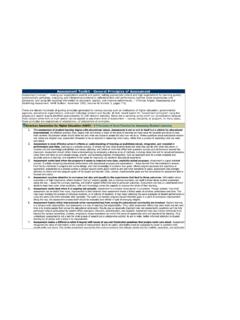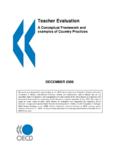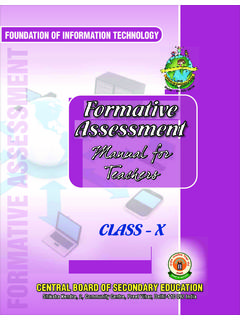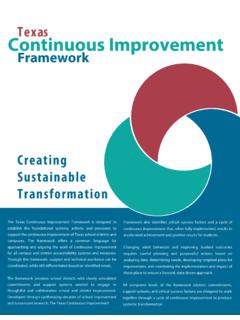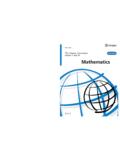Transcription of General Principles of Assessment
1 Assessment Toolkit - General Principles of Assessment Assessment involves "..making our expectations explicit and public; setting appropriate criteria and high expectations for learning quality; systematically gathering, analyzing, and interpreting evidence to determine how well performance matches those expectations and standards; and using the resulting information to document, explain, and improve " (Thomas Angelo, Reassessing and Redefining Assessment . AAHE Bulletin, November 1995, Volume 48 Number 3, pages 7-9). There are literally hundreds of guiding Principles generated by various sources such as institutions of higher education, governmental agencies, educational organizations, and even individual scholars and faculty. In fact, recent search for " Assessment Principles " using the search engine identfied approximately 51,300 relevant websites. Below are a sampling some worth our consideration because most contain some form of truth and/or can be applied to any/every level of Assessment -- course, discipline, or program.
2 In many cases, these Principles are adaptations of adaptations of Principles . American Association for Higher Education (AAHE) - 9 Principles of Good Practice for Assessing Student Learning Assessment of student learning begins with educational values. Assessment is not an end in itself but a vehicle for educationalimprovement. Its effective practice, then, begins with and enacts a vision of the kinds of learning we most value for students and strive to helpthem achieve. Educational values should drive not only what we choose to assess but also how we do so. Where questions about educational missionand values are skipped over, Assessment threatens to be an exercise in measuring what's easy, rather than a process of improving what we reallycare is most effective when it reflects an understanding of learning as multidimensional, integrated, and revealed inperformance over time.
3 Learning is a complex process. It entails not only what students know but what they can do with what they know; itinvolves not only knowledge and abilities but values, attitudes, and habits of mind that affect both academic success and performance beyond theclassroom. Assessment should reflect these understandings by employing a diverse array of methods, including those that call for actual performance, using them over time so as to reveal change, growth, and increasing degrees of integration. Such an approach aims for a more complete andaccurate picture of learning, and therefore firmer bases for improving our students' educational works best when the programs it seeks to improve have clear, explicitly stated purposes. Assessment is a goal-orientedprocess. It entails comparing educational performance with educational purposes and expectations -- those derived from the institution's mission,from faculty intentions in program and course design, and from knowledge of students' own goals.
4 Where program purposes lack specificity oragreement, Assessment as a process pushes a campus toward clarity about where to aim and what standards to apply; Assessment also promptsattention to where and how program goals will be taught and learned. Clear, shared, implementable goals are the cornerstone for Assessment that isfocused and requires attention to outcomes but also and equally to the experiences that lead to those outcomes. Information aboutoutcomes is of high importance; where students "end up" matters greatly. But to improve outcomes, we need to know about student experiencealong the way -- about the curricula, teaching, and kind of student effort that lead to particular outcomes. Assessment can help us understand whichstudents learn best under what conditions; with such knowledge comes the capacity to improve the whole of their works best when it is ongoing not episodic.
5 Assessment is a process whose power is cumulative. Though isolated, "one-shot" Assessment can be better than none, improvement is best fostered when Assessment entails a linked series of activities undertaken over time. Thismay mean tracking the process of individual students, or of cohorts of students; it may mean collecting the same examples of student performance or using the same instrument semester after semester. The point is to monitor progress toward intended goals in a spirit of continuous the way, the Assessment process itself should be evaluated and refined in light of emerging fosters wider improvement when representatives from across the educational community are involved. Student learningis a campus-wide responsibility, and Assessment is a way of enacting that responsibility. Thus, while Assessment efforts may start small, the aim overtime is to involve people from across the educational community.
6 Faculty play an especially important role, but Assessment 's questions can't be fullyaddressed without participation by student-affairs educators, librarians, administrators, and students. Assessment may also involve individuals frombeyond the campus (alumni/ae, trustees, employers) whose experience can enrich the sense of appropriate aims and standards for learning. Thusunderstood, Assessment is not a task for small groups of experts but a collaborative activity; its aim is wider, better-informed attention to studentlearning by all parties with a stake in its makes a difference when it begins with issues of use and illuminates questions that people really care about. Assessment recognizes the value of information in the process of improvement. But to be useful, information must be connected to issues or questions thatpeople really care about. This implies Assessment approaches that produce evidence that relevant parties will find credible, suggestive, and applicableto decisions that need to be made.
7 It means thinking in advance about how the information will be used, and by whom. The point of Assessment is not to gather data and return "results"; it is a process that starts with the questions of decision-makers, that involves them in the gathering and interpreting of data, and that informs and helps guide continuous improvement. 8. Assessment is most likely to lead to improvement when it is part of a larger set of conditions that promote change. Assessment alone changes little. Its greatest contribution comes on campuses where the quality of teaching and learning is visibly valued and worked at. On such campuses, the push to improve educational performance is a visible and primary goal of leadership; improving the quality of undergraduate education is central to the institution's planning, budgeting, and personnel decisions. On such campuses, information about learning outcomes is seen as an integral part of decision making, and avidly sought.
8 9. Through Assessment , educators meet responsibilities to students and to the public. There is a compelling public stake in education. As educators, we have a responsibility to the publics that support or depend on us to provide information about the ways in which our students meet goals and expectations. But that responsibility goes beyond the reporting of such information; our deeper obligation -- to ourselves, our students, and society -- is to improve. Those to whom educators are accountable have a corresponding obligation to support such attempts at improvement. Middle States Commission on Higher Education - 6 Guiding Principles of Assessment 1. Existing Culture. Begin by acknowledging the existence of Assessment throughout the institution in order to ensure that the Assessment plan is grounded in the institutional culture. 2. Realistic Plan with Appropriate Investment of Resources.
9 Plans for Assessment at the program, school, and institutional levels should be realistic and supported by the appropriate investment of institutional resources. 3. Involvement of Faculty and Students. Academic leadership is necessary in order to gain the support and involvement of faculty members, staff, administrators, and students across the institution. 4. Clear Goals. Assessment activities should be focused by a set of clear statements of expected student learning (knowledge, skills, competencies). 5. Appropriate Methods. Assessment should involve the systematic and thorough collection of direct and indirect evidence of student learning, at multiple points in time and in various situations, using a variety of qualitative and quantitative evaluation methods that are embedded in courses, programs, and overall institutional processes. 6. Useful Data. Data gained through Assessment activities should be meaningful.
10 They should be used, first, to enhance student learning at the institutional, program, and course levels; second, in institutional planning and resource allocation; and third, to evaluate periodically the Assessment process itself for its comprehensiveness and efficacy. Indiana University - 8 Principles of Assessment 1. The Assessment of student learning is based on goals set by faculty and students in mutual activity. 2. The Assessment of student learning is a formative process. 3. The Assessment of student learning is a continuous process. 4. The Assessment of student learning emphasizes self- Assessment as a natural part of the learning process. 5. The Assessment of student learning is embedded in the academic learning strategies. 6. The Assessment of student learning validates the goals established for the student's courses, program, and degree. 7. The Assessment of student learning must involve the sharing of the purposes and uses of Assessment with students.
